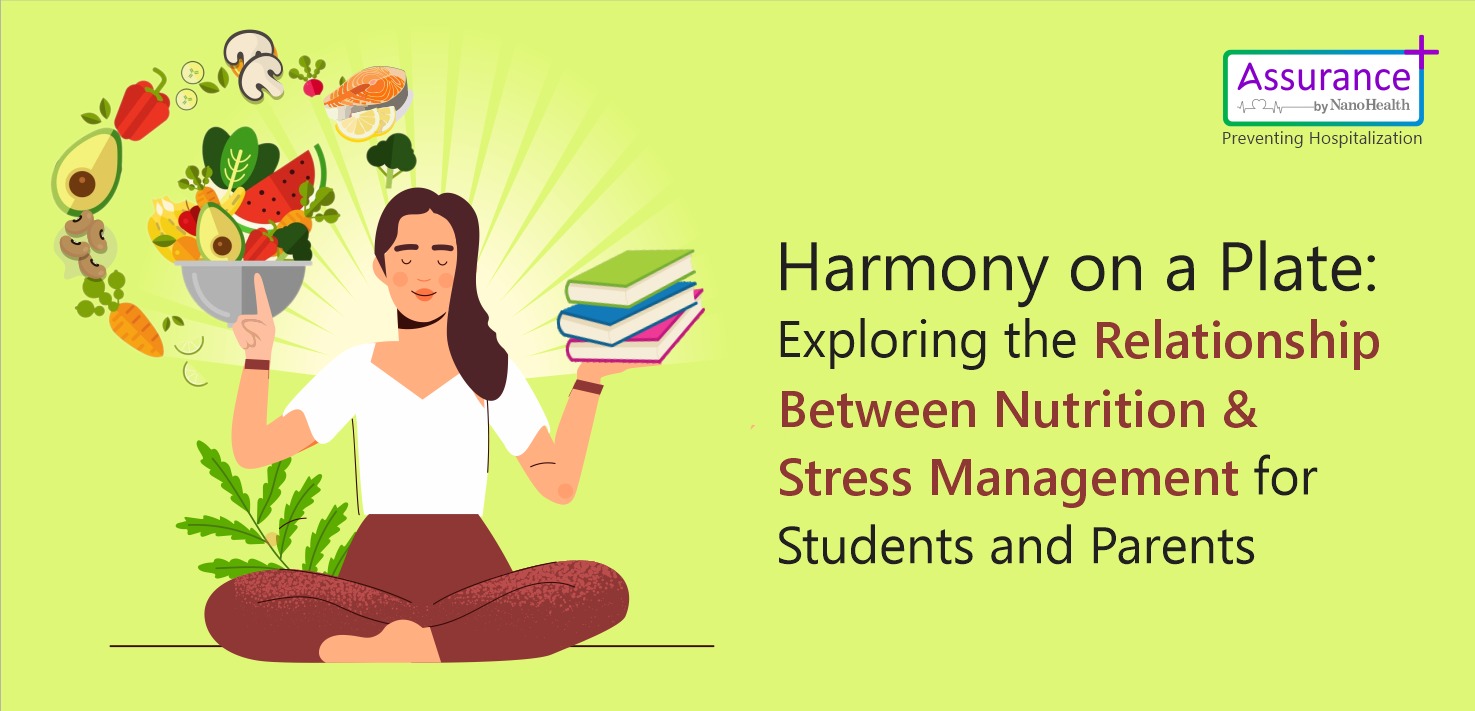

As exam season looms on the horizon, the stress levels of students often reach new heights. The pressure to perform well can be overwhelming, impacting not only mental well-being but also physical health.
In this session, we'll explore the intricate relationship between exam stress, diet, and overall resilience. Discover how a balanced diet can be the compass to guide you through the maze of exam-induced stress, helping you not only survive but thrive during this challenging period.
Mind-Body Connection
The connection between the mind and body is undeniable, and what we eat plays a crucial role in supporting both aspects. During periods of stress, the body releases hormones such as cortisol, and chronic elevation of cortisol levels can have significant effects on both the mind and body.
Changes like sleep disruption, fatigue, hair loss, immune system suppression are generally seen when the cortisol levels rise. Understanding this mind-body connection is essential for devising strategies to fuel success during exams.
But first, what is stress? Stress can be defined as a state of worry or mental tension caused by a difficult situation. Everyone experiences stress to some degree. The way we respond to stress, however, makes a big difference to our overall well-being.
Stress affects both the mind and the body. Too much stress can cause physical and mental health problems.
How to identify Stress:
Stress brings challenges like anxiety, irritability, and difficulty concentrating. It can lead to physical symptoms like headaches, upset stomach, and trouble sleeping, and may affect our appetite. Chronic stress worsens existing health issues and can contribute to mental health conditions like anxiety and depression, impacting our daily life.
Signs of stress in kids:
- Being moody or irritable
- Withdrawing from activities they once enjoyed
- Routinely expressing worry
- Complaining about school
- Crying
- Showing fearful reactions
- Becoming overly clingy
- Changing eating and sleeping patterns.
Here are some tips from the American Psychological Association to help children manage stress:
- Prioritize sleep: Aim for 9-12 hours a night for 6- to 12-year-olds and 8-10 hours for teens. Limit screen time before bed and keep digital devices out of the bedroom.
- Stay active: Encourage at least 60 minutes of physical activity each day
- Talk it out: Encourage kids to discuss their stress
- Make time for enjoyable activities: Allow unstructured playtime or dedicated hours for hobbies
- Spend time outdoors: Being in nature can reduce stress and enhance well-being, with research showing that green spaces correlate with lower levels of depression, anxiety, and stress.
- Promoting healthy habits: Parents and caregivers play a crucial role in promoting healthy habits and assisting children in discovering effective stress management techniques.
Balanced Diet as a Foundation:
A balanced diet acts as a foundation for mental and physical resilience. Including a variety of nutrient-rich foods, such as fruits, vegetables, whole grains, lean proteins, and healthy fats, provides the essential vitamins and minerals needed for optimal brain function and energy levels. This balance is key to sustaining focus and concentration during study sessions and exams.
Limit caffeine and sugar: Excessive consumption of caffeine and sugary foods can contribute to feelings of anxiety and stress. Opt for alternatives like herbal tea or water with lemon to stay hydrated without the negative effects of caffeine and sugar crashes.
Incorporate magnesium-rich foods: Magnesium has been shown to have calming effects on the nervous system. Include foods such as spinach, almonds, pumpkin seeds, and black beans in your diet to increase magnesium intake.
Increase omega-3 fatty acids: Omega-3 fatty acids, found in fatty fish like salmon, walnuts, and flaxseeds, may help reduce inflammation and alleviate symptoms of stress and anxiety. These aren't just brain-boosters; they're stress-busting superheroes ready to tame those tension-filled hormones!
Eat complex carbohydrates: Complex carbohydrates, such as whole grains, oats, and legumes, can help stabilize blood sugar levels and promote a steady release of energy, which can help prevent mood swings and reduce stress. Start your day with a bowl of stress-busting oats. As a complex carbohydrate, they're your ticket to stable blood sugar levels and a serotonin-filled mood lift!
Include probiotics: Gut health has been linked to mental health, so consuming probiotic-rich foods like yogurt, fermented foods like idli, dhokla may help support a healthy microbiome and reduce stress. Get your gut in on the action with probiotic-rich yogurt. Packed with good bacteria, it's your secret weapon for promoting gut health and kicking stress and anxiety to the curb.
Hydration for Mental Alertness :Staying hydrated is often overlooked but is fundamental for maintaining mental alertness. Dehydration can lead to fatigue, decreased cognitive performance, and increased feelings of stress. Drinking an adequate amount of water throughout the day can help optimize brain function and support overall well-being. Drinking 3-4 liters of water each day can enhance optimal brain function and foster mental clarity.
Mindful Eating and Stress Reduction :Practicing mindful eating can be a powerful tool in managing stress. Taking the time to savor each bite, paying attention to hunger and fullness cues, and being present during meals can foster a healthier relationship with food. Mindful eating not only enhances the nutritional benefits of your diet but also contributes to stress reduction by promoting a sense of mindfulness and relaxation.
Creating a Resilient Routine : In addition to a balanced diet, establishing a resilient routine can further support your well-being during exam season. Adequate sleep, regular physical activity, and moments of relaxation are integral components of a comprehensive approach to stress management.
Picture this: a symphony of foods not only tantalizing your taste buds but also working their magic to ease tension. These stress-busting superheroes don't just stop at your plate; they're part of a grander plan that includes regular exercise, rejuvenating sleep, and mastering stress-busting techniques.
So, here's the star-studded lineup of stress-relief champions:
Dark Chocolate: Indulge in the decadent world of dark chocolate, where antioxidants and endorphins throw a party for your taste buds. Just make sure your chocolate fix is packed with cocoa for the ultimate mood-boosting extravaganza!
Berries: Imagine a burst of antioxidant fireworks in every bite! Blueberries, strawberries, Indian gooseberries (amla), phalsa (wild berries), and ber (Indian jujube) team up to tackle stress and inflammation, painting your palate with a rainbow of flavors.
Nuts and Seeds: Crunch into the stress-relief power pack of almonds, walnuts, and pumpkin seeds. Loaded with magnesium, zinc, and omega-3 fatty acids, they're your go-to snack for turning stress into smiles!
Bananas: Peel into relaxation mode with potassium-packed bananas. With a boost of vitamin B6, they're your stress-busting buddies, helping regulate blood pressure and neurotransmitters for a chillaxed vibe.
Chamomile Tea: Sip your worries away with a cup of chamomile tea. Famous for its calming effects, it's your daily dose of zen, soothing anxiety and inviting relaxation into your world.
Citrus Fruits: Oranges, grapefruits, and citrus companions such as lemon, etc. bring a burst of vitamin C to the stress-busting fiesta. Watch stress hormones take a back seat as your immune system gets a powerful boost.
Turmeric: Enter the golden superhero, turmeric! Curcumin, its active compound, not only fights inflammation but also paints your mood canvas with positive vibes.
RECIPE:
Dark Chocolate Berry Smoothie
Ingredients:
- Mixed berries (strawberries, blueberries, raspberries)
- Greek yogurt
- Dark chocolate (70% cocoa or higher)
- Honey (optional)
- Ice cubes
Instructions:
- Blend mixed berries, Greek yogurt, a square of dark chocolate, and ice cubes until smooth.
- Add honey for sweetness if desired.
- Pour into a glass and enjoy the antioxidant-rich, mood-boosting smoothie.
Spinach and Walnut Salad:
Ingredients:
- Fresh spinach leaves
- Walnuts, toasted
- Sliced strawberries
- Feta cheese
- Balsamic vinaigrette dressing
Instructions:
- Toss fresh spinach leaves with toasted walnuts, sliced strawberries, and crumbled feta cheese.
- Drizzle with balsamic vinaigrette dressing.
- Enjoy a nutrient-packed salad that's rich in magnesium and antioxidants.
So, there you have it—a stress-relief banquet that goes beyond the palate to embrace a holistic approach to well-being. Dive in, savor the goodness, and let the stress melt away like butter on warm toast!
Assurance by NanoHealth: Your trusted healthcare partner
Amid the storm of exams, let your plate be a sanctuary. Nourish not just your body, but your mind.
At Assurance by NanoHealth, we help you in the timely identification, diagnosis and treatment/management of your underlying health conditions to help you achieve maximum health and wellness. If you are interested in improving your diet and nutrition, you can count on us!
Our expert dietitians can help you achieve your health and wellness goals through personalized nutrition counseling by discussing your current eating habits, lifestyle, and health goal and creating a customized nutrition plan that is tailored to your unique needs and preferences.
Whether you want to lose weight, manage a health condition, or simply optimize your overall health and well-being, we are here to support you every step of the way. Take the first step towards a healthier, happier you and get in touch with our health experts by calling +91 91004 44004 or visiting our website www.nhassurance.com.
